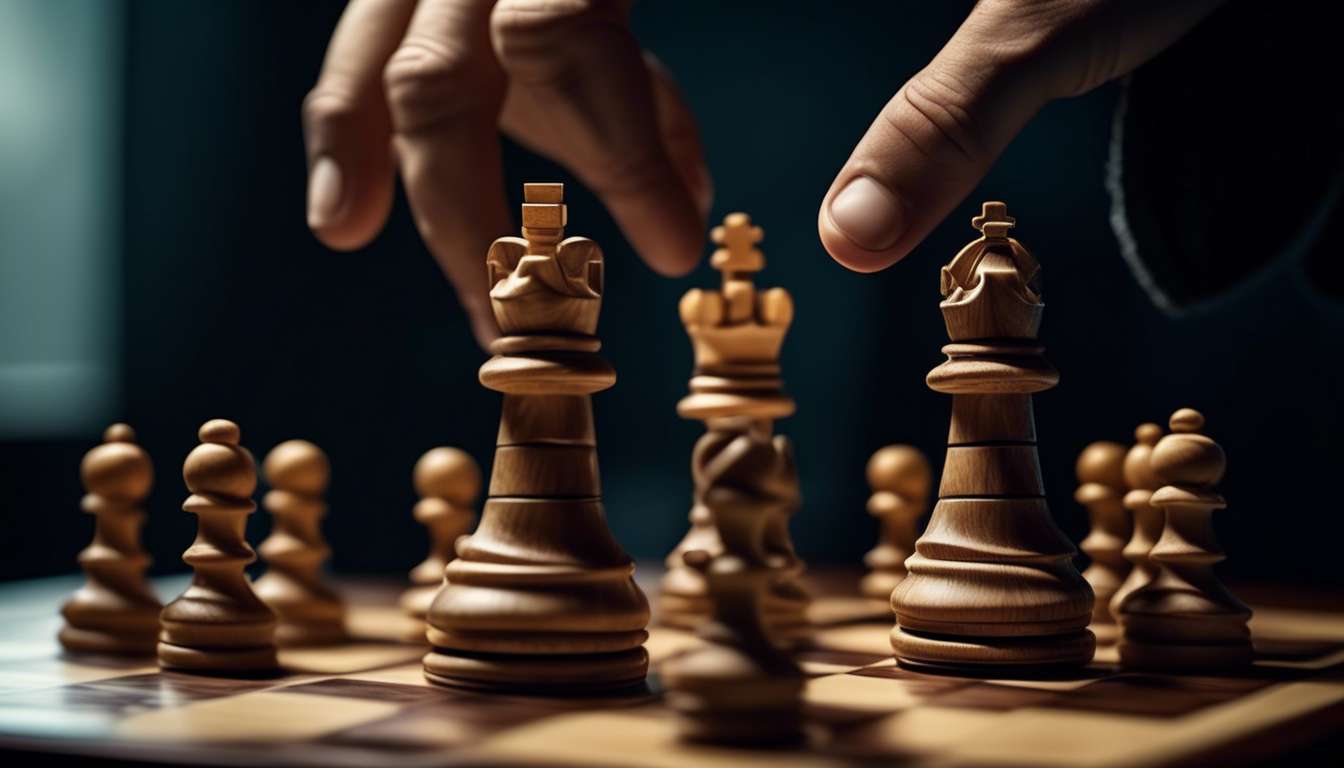In the thrilling world of competitive gaming, we stand united by our shared passion for tournaments and the adrenaline rush that accompanies each match. As seasoned players, we understand the importance of strategic mastery and the difference it can make in our performance.
Today, we embark on a journey to explore the ’12 Power Moves for Deep Tournament Runs,’ a comprehensive guide designed to elevate our game and increase our chances of success. Together, we will delve into advanced strategies and techniques that can transform us from competent competitors into formidable contenders.
Whether we’re veterans of the scene or newcomers eager to make our mark, these power moves serve as essential tools in our arsenal. By honing our skills and embracing these tactics, we empower ourselves and our teams, unlocking the potential to navigate the challenging landscape of tournaments with confidence and precision.
Let’s dive in and discover what it takes to make a memorable deep run.
Mastering Key Mechanics
Mastering key mechanics is crucial for making deep tournament runs because it allows us to execute strategies with precision and adaptability. When we grasp the essential mechanics, we’re not just players; we become an integral part of a well-oiled team, moving in harmony towards a shared goal.
Understanding mechanics means we can make split-second decisions that align with our team’s strategies, ensuring everyone’s on the same wavelength. We form a connection that transcends individual skill, creating a sense of unity and belonging.
Effective communication plays a pivotal role in mastering these mechanics. It’s not just about talking; it’s about listening and understanding each team member’s strengths. By communicating clearly and concisely, we bolster our strategies and anticipate our opponents’ moves.
This shared understanding fosters a supportive environment where everyone feels valued and connected. As we hone our mechanics, we’re not just improving individually; we’re elevating our entire team, paving the way for deeper connections and tournament successes.
Developing Adaptive Strategies
Adapting our strategies mid-tournament is essential for outsmarting opponents and seizing victory. When we dive into competition, the playing field constantly shifts, demanding that we remain flexible and responsive. By fine-tuning our mechanics and adjusting our tactics, we align ourselves with the dynamic nature of the game.
This adaptability doesn’t just set us apart; it fosters an inclusive team environment where each member feels like a vital part of the journey.
As a team, we thrive on clear communication, ensuring everyone knows their role in our evolving strategy. This shared understanding allows us to pivot quickly, leveraging our collective strengths while addressing emerging challenges.
We know that agility in strategy isn’t just about reacting; it’s about anticipating opponent moves and proactively crafting responses.
Together, we cultivate an atmosphere where every voice matters, empowering us to not only react but to foresee and adjust.
These adaptive strategies propel us forward, strengthening our unity and enhancing our chances of victory.
Building Effective Team Communication
Clear and concise dialogue forms the backbone of our team’s success, ensuring we all stay in sync and focused on our objectives. We understand that fostering an environment where everyone feels heard and valued strengthens our bond.
Effective communication isn’t just about talking; it’s about actively listening and adapting our strategies based on real-time feedback. When we discuss game mechanics, each member contributes, ensuring we leverage everyone’s insights to refine our gameplay.
Pre-game meetings serve as a crucial platform for aligning on strategies and identifying roles. During these discussions, we:
- Break down complex mechanics into digestible pieces
- Enable everyone to grasp and execute them efficiently
We believe that our collaborative spirit and open dialogue empower us to overcome obstacles together.
On the field, quick and clear communication is vital. We rely on:
- Signals
- Shorthand
These methods convey essential information swiftly, keeping our momentum strong. This unified approach not only enhances our performance but also strengthens our sense of belonging and teamwork.
Analyzing Opponents’ Playstyles
Understanding our opponents’ playstyles is crucial for developing effective counter-strategies and gaining a competitive edge.
In the heat of competition, recognizing the mechanics our opponents favor gives us insight into their strategies. Are they aggressive, or do they prefer a more defensive stance? Noticing these tendencies allows us to tailor our approach and anticipate their next moves.
As a team, we should communicate openly about opponents’ playstyles. Sharing observations and insights strengthens our collective understanding, ensuring we’re all on the same page. This unity fosters a sense of belonging, as everyone contributes to the strategy, making us more cohesive.
When we analyze opponents, focus on their decision-making patterns:
- Do they rely on specific tactics?
- Are there weaknesses in their mechanics we can exploit?
By identifying these elements, we empower ourselves to adapt and counter effectively.
Our ability to read and react to our opponents’ playstyles will set us apart and propel us to deeper tournament runs.
Maintaining Mental Resilience
In the high-pressure environment of tournaments, maintaining mental resilience is crucial for consistent performance. Together, we must focus on refining our mechanics to ensure each move is executed with precision. This requires ongoing practice and dedication, building a foundation we can rely on under stress.
We should also develop strategies that allow us to adapt quickly to unexpected challenges, keeping us one step ahead of our opponents.
Communication plays a vital role in bolstering our mental resilience. By openly discussing our experiences and emotions within our team, we create a supportive network that helps us stay grounded. Sharing insights and learning from each other enables us to navigate the tournament’s pressures more effectively.
When we strengthen our mental fortitude, we’re better equipped to handle setbacks and maintain our focus. Let’s keep encouraging each other, using our shared knowledge to foster a sense of unity and belonging, ensuring we thrive together throughout the competition.
Utilizing Map Control Techniques
Dominating the map is essential for gaining a strategic edge in tournaments, allowing us to dictate the pace and flow of the game. By mastering map control techniques, we ensure that our team stays one step ahead of our opponents.
Effective Map Control hinges on solid mechanics, which help us maintain an awareness of key areas and resources. We must practice these mechanics regularly to keep our skills sharp and responsive.
Strategies play a crucial role in how we approach map control. Whether we’re securing objectives or setting ambushes, having a well-coordinated plan increases our chances of success. It’s crucial to adapt our strategies based on the evolving dynamics of the match.
Communication is the glue that holds our map control efforts together. By maintaining open lines of communication, we create a sense of unity and belonging among team members. Sharing information about enemy movements and predicting their plans allows us to make informed decisions, keeping us in control.
Implementing Precision Shotcalling
To achieve precise shotcalling, we must develop a clear and concise communication style. This ensures everyone on the team is aligned and responsive during critical moments. Our collective focus on communication becomes the foundation of our success.
Key Steps to Enhance Communication:
-
Refine Mechanics:
- Ensure each member understands their role.
- Execute strategies flawlessly.
-
Speak the Same Language:
- Anticipate each other’s moves.
- Adapt swiftly to changing situations.
During Matches:
- Communication should be as sharp as gameplay.
- Call out plans clearly to ensure everyone knows their responsibilities.
By doing so, we create a sense of belonging, where each player’s input is valued, and our strategies are executed seamlessly.
Practice Regularly:
- Foster an environment where we learn from each other.
- Grow together, enhancing unity and precision.
This unity and precision can propel us toward deeper tournament runs.
Reviewing and Improving Gameplay Footage
Analyzing gameplay footage gives us crucial insights into our performance, helping identify areas for improvement and strategic adjustments.
By reviewing our matches, we can:
- Pinpoint where our mechanics need refining
- Identify which strategies require tweaking
Watching ourselves play, we see not only our technical skills but also the moments where our communication shines—or falters. This collective reflection fosters a deeper understanding of our strengths and weaknesses.
Team Dynamics During Intense Moments
Let’s focus on how our team’s dynamics unfold during intense moments. Key considerations include:
- Are we staying true to our game plan, or do we need to adapt our strategies?
- Are we clear and concise in our communication, ensuring everyone knows their role?
- Do we stumble over our words when it counts?
By addressing these questions, we enhance our synergy and cohesiveness.
Ultimately, this practice isn’t just about improving; it’s about growing together as a team, ensuring we’re always evolving and ready for whatever challenges come our way.
Conclusion
To sum it up, achieving success in tournaments involves several key components:
-
Master Key Mechanics:
- Develop a thorough understanding and execution of game mechanics.
-
Develop Adaptive Strategies:
- Continuously adapt strategies based on the flow of the game and opponent behavior.
-
Build Effective Team Communication:
- Ensure clear and concise communication among team members to coordinate actions efficiently.
Additional Strategies for Success:
-
Analyze Opponents’ Playstyles:
- Study and understand the tactics and tendencies of your opponents to anticipate their moves.
-
Stay Mentally Resilient:
- Maintain focus and composure, especially under pressure, to make sound decisions.
-
Utilize Map Control Techniques:
- Master the map to gain strategic advantages over opponents.
-
Implement Precision Shotcalling:
- Make decisive calls to direct team actions effectively during critical moments.
-
Review and Improve Gameplay Footage:
- Regularly analyze past games to identify areas for improvement and refine strategies.
With these power moves in your arsenal, you’re well-equipped to dominate the competition and achieve success in tournaments.
Keep grinding and reaching for those championship titles!

